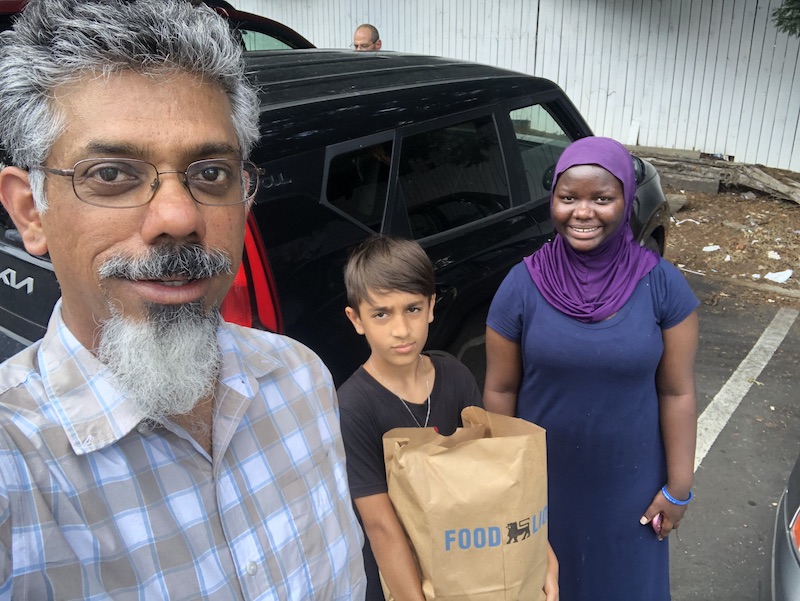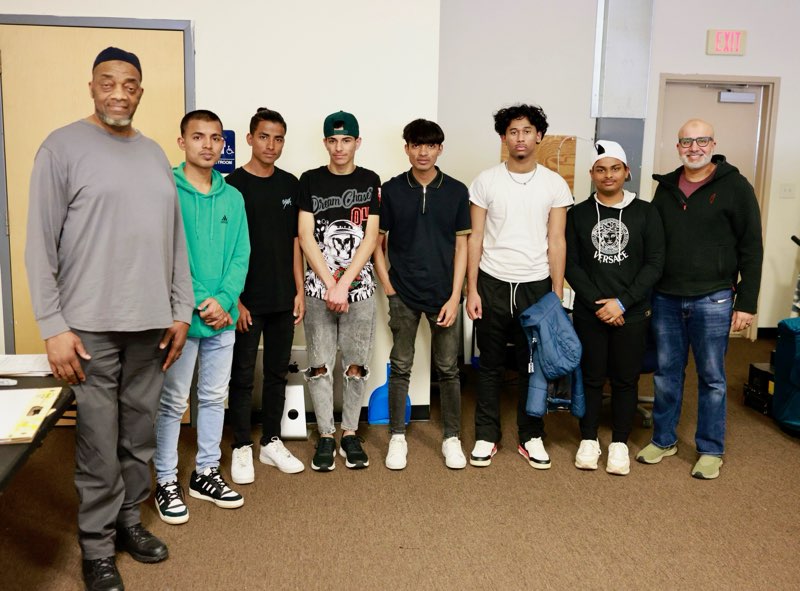Empowering Refugees and Low-Income Community Members in North Carolina
Approximately 13% North Carolinians live in poverty, according to 2023 US Census Bureau statistics (source). However, the proportion of Black (18.7%), Hispanic/Latino (20.7%), and American Indian (22.4%) populations living in poverty is much higher. A significant number of immigrants and refugees also face persistent poverty. The US Census Bureau reveals that approximately 1/3rd of all immigrants (33%) live in poverty. As a result, they face lack of food, denial of quality/affordable housing, denial of healthcare, lack of quality education, and denial of other basic rights.
North Carolina-based Local to Global Human Development has a mission to serve impacted people in North Carolina and many countries in South Asia and Middle East where our members have family connections. A significant number of people in our base are refugees from different countries, including Rohingya, Afghan, Syrian, Somali, Congolese, and other refugees. Many have escaped genocide and extreme violence (Burma, Congo, Sudan, and other conflicts). We also serve many low-income immigrants from South Asia and the Middle East, as well as, African American community members. A significant number of people we serve are unemployed/underemployed, lack basic healthcare, face hunger, and many lack English language fluency. Many of our people have mental health crises as a result of stresses in life and lack of access to healthcare. Some of the community members we serve have family members detained or incarcerated. These factors compound their circumstances, pushing them further into a cycle of poverty.
Local to Global Human Development has launched a program to distribute food to Black, Brown, and working class community members in the Triangle area of North Carolina and other regions, including Rocky Mount, NC. A significant number of people we work with live in abject poverty, where the bulk of their salary/income goes to housing (most of our people pay 50% or more of their income for housing/rent), transportation, and utilities, and they have little money for food or healthcare. Access to healthy/nutritious food is essential for them and especially children in critical stages of growth.
English essay writing support for Congolese refugees. April 6, 2024
Citizenship test preparation for a Rohingya family in Knightdale, NC. July 2024.
L2G does not believe that charity alone will not uplift people out of poverty Instead, we are dedicated to long term empowerment of our people so they support their family members as well as help others in their community. Therefore, in addition to food distribution, we offer translation services to apply for healthcare, loans/education scholarships, citizenship test preparation, job application process, and other services. We also provide homework support to youth in our base. Our goal is to build the power of the impacted people so they lift themselves out of poverty and also help other members in their communities. In fact, English proficiency, including reading and writing in English, is linked to upward mobility and financial stability for many immigrants and refugees.
Research shows that the most resilient communities are the most organized communities, where people take care of each other, share resources, share knowledge, and build their collective power. L2G operates from the philosophy by organizing solidarity-based charity and building people's power one-on-one. In addition to food drives and home-work support/translation services, we organize political education sessions and organize non-partisan civic engagement to win people's rights.
**********
Context of Poverty and Hunger in North Carolina
North Carolina, often lauded for its economic growth and natural beauty, harbors a persistent issue: disparities in poverty and hunger rates, particularly among Black, brown, and refugee communities. This essay sheds light on the concerning realities of food insecurity and economic hardship faced by these vulnerable populations.
Data paints a grim picture. According to a 2023 report by Feeding America, North Carolina has an overall food insecurity rate of 12.3%, translating to over 1.3 million residents struggling to access enough nutritious food. This statistic masks a deeper problem: racial and ethnic disparities. Black and Hispanic households in North Carolina experience food insecurity at significantly higher rates compared to white households (20.2% and 17.7% vs. 8.2%, respectively) (Feeding America, 2023). The reasons behind this disparity are complex and multifaceted. A 2022 study published in the “Journal of Racial and Ethnic Health Disparities” by Sarah Burnett-Heckman et al. highlights the role of systemic factors such as “racial discrimination in housing, employment, and healthcare” in contributing to higher poverty rates among Black and Hispanic communities. This translates into limited access to affordable housing, lower wages, and fewer opportunities for economic mobility, ultimately impacting food security.
North Carolina also has a growing refugee population. A 2021 report by the North Carolina Justice Center details the unique challenges faced by refugees in accessing food assistance programs. Language barriers, complex bureaucratic processes, and cultural differences can all contribute to difficulties in navigating the food assistance system. The report emphasizes the need for culturally appropriate outreach and streamlined programs to ensure refugees have equal access to vital food resources.
The consequences of such food insecurity are quite dire. A 2020 study published in “Public Health Nutrition” by Jessica Todd et al. explores the link between food insecurity and negative health outcomes. The study finds a correlation between inadequate food intake and an increased risk of chronic diseases like diabetes, heart disease, and obesity (Todd et al., 2020). These health concerns further strain individual and community resources, creating a vicious cycle.
Addressing this complex issue requires a multi-pronged approach. Expanding access to affordable housing, promoting living wage jobs, and dismantling racial and ethnic barriers in the workforce are crucial steps toward economic empowerment and improved food security for communities of color. Additionally, streamlining food assistance programs and ensuring culturally appropriate outreach can significantly benefit refugee populations. Furthermore, investing in community gardens, food banks, and nutrition education programs can provide immediate relief and empower residents to make healthier food choices. Collaboration between government agencies, non-profit organizations, and community leaders is essential to develop and implement effective solutions.
North Carolina's struggle with poverty and hunger is a challenge demanding immediate attention. By acknowledging the disproportionate impact on Black, brown, and refugee communities, and by implementing targeted solutions, the state can begin to create a more equitable and food-secure future for all its residents.
Works Cited
Feeding America. "Map the Meal Gap." Feeding America, 2023. https://map.feedingamerica.
Burnett-Heckman, Sarah, et al. "Racial and Ethnic Disparities in Food Insecurity among US Households, 2018." Journal of Racial and Ethnic Health Disparities, vol. 9, no. 6, 2022, pp. 1342-1352. [link to the journal article - you can find it through a library database or online search]
North Carolina Justice Center. "Hungry No More: A Roadmap to Improve Access to Food Assistance for Refugees in North Carolina." North Carolina Justice Center, 2021. [link to the report - you can find it through a library database or online search]
Todd, Jessica E., et al. "Household Food Insecurity and Diet Quality among Adults in the United States: NHANES 2009-2014." Public Health Nutrition, vol. 23, no. 12, 2020, pp. 2237-2247. [link to the journal article - you can find it through a library database or online search]
World Health Organization. "Mental Health of Persons with Disabilities." World Health Organization, 2022. https://www.who.int/health-








Comments
Post a Comment